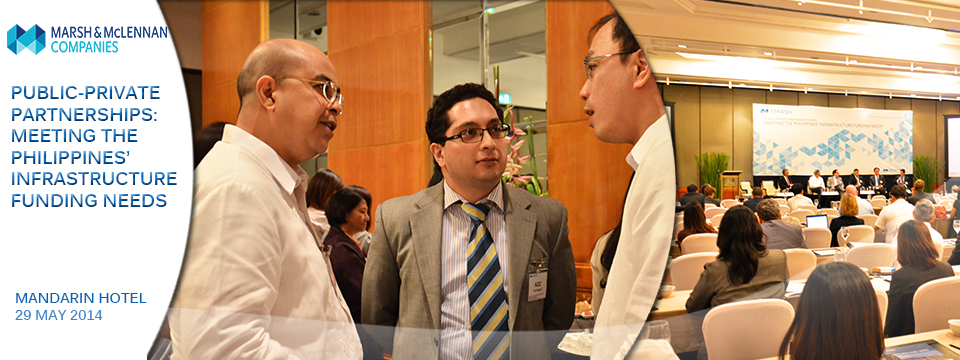
Key Note Speech
Public-Private Partnerships Meeting the Philippines’ Infrastructure Funding Needs
Marsh and McLennan Companies
Mandarin Oriental, Makati City
May 29, 2014
Ladies and gentlemen, good afternoon!
For many years, the Philippines’ infrastructure spending in relation to GDP has been low especially when compared to our neighboring countries. This hindered the development of an efficient and critical set of modern infrastructure needed to meet the challenges of having a high and rising urban population density.
It is in this context that the Philippines has identified the Public-Private Partnership (PPP) Program as one of the strategies to fast-track the implementation of the Philippine Government’s infrastructure agenda geared towards inclusive growth and international competitiveness.
Managing and facilitating a PPP Program, however, is not an easy task. Public-private partnership is a complex process involving various technical, political, financial, and legal frameworks for it to work.
In the past couple of years, the PPP Center in partnership with various government agencies and industry stakeholders, worked hard in laying the foundations for fruitful partnerships—setting up the legal and regulatory frameworks, coming up with a robust pipeline of projects, capacitating significant PPP players, streamlining of processes, and improving on actual PPP implementation.
All of these efforts are now being implemented and have greatly helped in putting up our bankable pipeline of PPP projects.
In fact, when the Program was launched in 2010, the Philippines’ PPP pipeline started off with only 10 projects. In less than two (2) years, the country’s PPP pipeline has grown and has been continuously attracting local and foreign investors. To date, the PPP Center has been facilitating a robust pipeline of over 50 projects with an estimated total cost of USD 22.05 billion.
While such is the case, however, a lot more has to be done to improve the Philippines’ emerging market for PPPs. One of which is the focal topic of today’s event—addressing PPP risks and insurance.
For a sustainable PPP contract, it is critical that the government develop a strong framework to support the risks absorbed by the government. Appropriate risk allocation is the essence of public-private partnerships.
Primarily, we abide by the basic principle on risk allocation and transfer—that the party best able to manage a given risk is the party who should bear it. Usually, the private sector takes on the commercial risks including those related to construction and completion, operation and maintenance, revenues, and economic environment; while the public sector covers non-commercial ones such as legal, regulatory, and political risks.
The government has been proactive in institutionalizing the contingent liability fund for PPPs—a fund to be drawn if the government breaches on its obligations under the contracts. In the 2014 National Expenditure Program, the PPP Center supported the proposed authorization of funds to cover materialized PPP contingent liabilities. The initial appropriation amounts to: PHP 20 billion / USD 444.44 million. The DOF is now finalizing a policy statement and guidelines on this matter, making sure that the fund will be able to accommodate the potential CLs of the projects in the pipeline.
Moreover, we also put high regard in PPP contracts prepared in a transparent manner, promote a level playing field, and can withstand legal scrutiny even beyond this administration. It cannot be overemphasized that contract drafting is critical as this has financial implications on the business of the private sector.
The government has likewise embarked on initiatives to ensure that potential conflicts that may arise during implementation are properly resolved. PPP contracts provide for an alternative dispute resolution mechanism as mandated by Executive Order No. 78 issued in 2012.
Most importantly, the Program recognizes the fact that upholding the sanctity of contracts is critical to the long-term success and sustainability of PPPs in the Philippines.
All these initiatives are included in the proposed PPP Act which is now being taken up in Congress with the end view of institutionalizing them along with the other initiatives that we have put in place under this administration.
At this point, allow me to recognize all the organizers of this event, especially the Marsh team who have made all these possible. Thank you for giving us an opportunity to speak and share our story.
Today is an opportunity to share our various experiences and learn more about the international best practices on PPP risk management and insurance. To our partners in the private sector and our experts present here today, we enjoin you to raise your and suggestions on how we can improve this significant aspect of the Program. To my colleagues in the public sector, I enjoin you to take advantage of this event to have a better appreciation of the inputs from our partners. Together, let us work towards a robust PPP environment characterized by shared risks and sustainable partnerships.
Colleagues, let the discussions begin.
Thank you very much and a pleasant day to all.

